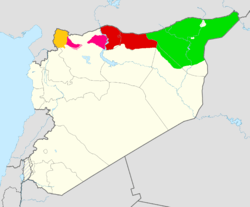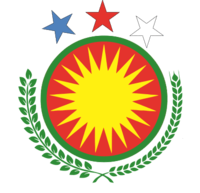Afrin Canton
| Afrin Canton Kantona Efrînê | |||
|---|---|---|---|
|
one of four de facto autonomous cantons of the region of Rojava in Syria | |||
| |||
 The three cantons of Rojava: Afrin Canton (orange), Kobanî Canton (red), Jazira Canton (green), and the Shahba region (pink) | |||
| Country |
| ||
| Governorate | Aleppo | ||
| De facto Administration | Federation of Northern Syria - Rojava | ||
| Autonomy declared | January 29, 2014 | ||
| Administrative center | Afrin | ||
| Government | |||
| • Prime Minister | Hevi Ibrahim | ||
| Population | |||
| • Estimate (2004) | 172,095[1] | ||
| Time zone | EET (UTC+2) | ||
| • Summer (DST) | EEST (UTC+3) | ||
| Area code | +963 21 | ||
| Website | http://cantonafrin.com/en/ | ||

Afrin Canton (Kurdish: Kantona Efrînê) is the westernmost of the four cantons of Rojava. It was declared autonomous in January 2014.[2][3] The canton was established on Afrin District of the Aleppo Governorate of Syria. The administrative center of the canton is the town of Afrin.[4] The prime minister of Afrin Canton is Hevi Ibrahim.
Geography
Afrin is the furthest west and most mountainous part of Rojava. It consists of southern part of the Kurd Mountains. Afrîn Canton is bordered by the de facto Shahba region to the east, Kilis Province of Turkey to the north and Hatay Province of Turkey to the west, Al-Dana Nahiyah of the Harem District of Idlib and Mount Simeon District of Aleppo Governorates of Syria to the south.
Demographics
The population of the Afrin Canton area is overwhelmingly ethnic Kurdish, to the degree that the canton has been described as "homogeneously Kurdish".[5] Its overall population number according to the 2004 Syrian census was 172,095.[6]
Cities and towns with more than 10.000 inhabitants according to the 2004 Syrian census are Afrin (36,562) and Jandairis (13,661).
Throughout the course of the Syrian Civil War, Afrin Canton has been a safe haven for inbound refugees of all ethnicities, fleeing violence and destruction from civil war factions, in particular the Islamic State of Iraq and the Levant (ISIL) and the diverse more or less Islamist rebel groups of the Syrian opposition.[7][8] According to a June 2016 estimate from the International Middle East Peace Research Center, about 316,000 displaced Syrians of Kurdish,Yazidis, Arab and Turkmen ethnicity lived in Afrin Canton at the time.[9]
History
According to René Dussaud, the region of Kurd-Dagh and the plain near Antioch were settled by Kurds since antiquity.[10][11] Stefan Sperl says that there is a reason to believe that Kurdish settlements in the Kurd Mountains go back to the Seleucid era, since those regions stood in the path to Antioch; Kurds in the early periods served as mercenaries and mounted archers.[12] In any case, the Kurd Mountains were already Kurdish-inhabited when the Crusades broke out at the end of the 11th century.[13]
The area around Afrin, today's Afrin Canton, over the centuries developed as the center of a distinctive Sufi "Kurdish Islam".[14] In modern post-independence Syria, the Kurdish society of the region was subject to heavy-handed Arabization policies by the Damascus government.[15]
In the course of the Syrian Civil War, Damascus government forces pulled back from the region in spring 2012 to give way to autonomous self-administration within the Rojava framework, which was formally declared on 29 January 2014, and the territory of Afrin Canton has virtually never seen civil war combat.[16] It has however at various times been the target of artillery shelling by Islamist rebel groups[17] as well as by Turkey.[18][16][19]
Politics and administration
According to the Constitution of Rojava, Afrin Canton's Legislative Assembly on its 29 January 2014 session declared autonomy.[20] The assembly elected Hêvî Îbrahîm Mustefa prime minister, who appointed Remzi Şêxmus and Ebdil Hemid Mistefa her deputies.
The remaining Executive Council was appointed as follows:[21]
| Name | Party | Office | Elected | Notes | |
|---|---|---|---|---|---|
| Hêvî Îbrahîm Mustefa | PYD | Prime Minister | 2014 | ||
| Remzi Şêxmus | PYD | Deputy Prime Minister | 2014 | ||
| Ebdil Hemid Mistefa | PYD | Deputy Prime Minister | 2014 | ||
| Silêman Ceefer | N/A | Foreign Minister | 2014 | ||
| Ebdo Îbrahîm | PB-ASD | Defense Minister | 2014 | ||
| Hesen Beyrem | N/A | Interior Minister | 2014 | ||
| Nûrşan Hisên | PADKS | Regional Commissions, Councils and Planning Minister |
2014 | ||
| Remezan Elî | N/A | Finance Minister | 2014 | ||
| Erîfe Bekir | N/A | Labour and Social Security Minister | 2014 | ||
| Riyaz Menle Mehemed | N/A | Education Minister | 2014 | ||
| Eyûb Mihemed | N/A | Minister of Agriculture | 2014 | ||
| Xelîl Şêx Hesen | N/A | Health Minister | 2014 | ||
| Ehmed Yûsif | N/A | Economy and Trade Minister | 2014 | ||
| Riyaz Ebdilhenan Şêxo | N/A | Minister of Martyrs' Families | 2014 | ||
| Hêvîn Şêxo | N/A | Culture Minister | 2014 | ||
| Welîd Selame | N/A | Transport Minister | 2014 | ||
| Fazil Robcî | N/A | Youth and Sports Minister | 2014 | ||
| Reşîd Ehmed | N/A | History and Tourism Minister | 2014 | ||
| Mihemed Hemîd Qasim | N/A | Religious Affairs Minister | 2014 | ||
| Fatme Lekto | N/A | Women and Family Minister | 2014 | ||
| Xelîl Sîno | N/A | Human Rights Minister | 2014 | ||
| Etûf Ebdo | N/A | Supervision Minister | 2014 | ||
| Ebdil Rehman Selman | N/A | Information Minister | 2014 | ||
| Seîd Esmet Xûbarî | N/A | Justice Minister | 2014 | ||
| Kamîran Ehmed Şefîi Bilal | N/A | Energy Minister | 2014 | ||
Economy

A diverse agricultural production is at the heart of the Afrin Canton economy,[22] traditionally in particular olives, and more recently there was a focus on increasing wheat production.[23] A well-known product is Aleppo soap, a hard soap made from olive oil and lye, distinguished by the inclusion of laurel oil. While Afrin Canton has been the source of olive oil for Aleppo soap since antiquity, the destruction caused by the Syrian Civil War to other parts of Aleppo governorate has increasingly made the entire production chains locate in Afrin Canton.[24][25]
Afrin Canton is under an embargo imposed by Turkey,[26] which places high burdens on international import and export. For example, transportation of Aleppo soap to international markets, as far as possible at all, has at least four times the transportation cost as compared to pre-war years.[27]
Education
Like in the other Rojava cantons, pimary education in the public schools is initially by mother tongue instruction either Kurdish or Arabic, with the aim of bilingualism in Kurdish and Arabic in secondary schooling.[28][29] Curricula are a topic of continuous debate between the cantons' Boards of Education and the Syrian central government in Damascus, which partly pays the teachers.[30][31][32][33]
The federal, cantonal and local administrations in Rojava put much emphasis on promoting libraries and educational centers, to facilitate learning and social and artistic activities.[34]
Afrin Canton has one institution of higher education, the University of Afrin, founded in 2015. After teaching three programs (Electromechanical Engineering, Kurdish Literature and Economy) in the first academic year, the second academic year with an increased 22 professors and 250 students has three additional programs (Human Medicine, Journalism and Agricultural Engineering).[35]
See also
References
- ↑ http://www.cbssyr.sy/General%20census/census%202004/pop-man.pdf
- ↑ "Democratic autonomy has declared in Afrin canton in Rojava". Mednuce. 29 January 2014. Retrieved 23 October 2014.
- ↑ "After Cizîre, Kobanê Canton has been declared". Firat News. Retrieved 23 October 2014.
- ↑ "The Constitution of the Rojava Cantons; Personal Website of Mutlu Civiroglu". civiroglu.net. Retrieved 23 October 2014.
- ↑ "Rojava's Sustainability and the PKK's Regional Strategy". Washington Institute. 2 August 2016. Retrieved 2016-10-18.
- ↑ http://www.cbssyr.sy/General%20census/census%202004/pop-man.pdf
- ↑ "Serious allegations against the Turkish government". Gesellschaft für bedrohte Völker. 2 August 2016. Retrieved 2016-10-18.
- ↑ "1,150 emigrants enter Afrin canton". ANHA. 18 October 2016. Retrieved 2016-10-18.
- ↑ "Will Afrin be the next Kobani?". Al-Monitor. 9 June 2016. Retrieved 2016-10-18.
- ↑ Dussaud, René (1927). Topographie historique de la Syrie antique et médiévale. Geuthner. p. 425.
- ↑ Chaliand, Gérard (1993). A People Without a Country: The Kurds and Kurdistan. Zed Books. p. 196. ISBN 9781856491945.
- ↑ Kreyenbroek, P.G.; Sperl, S. (1992). The Kurds: A Contemporary Overview. Routledge. p. 116. ISBN 0415072654.
- ↑ Kreyenbroek, P.G.; Sperl, S. (1992). The Kurds: A Contemporary Overview. Routledge. p. 114. ISBN 0415072654.
- ↑ Tejel, Jordi; Welle, Jane (2009). Syria's kurds history, politics and society (PDF) (1. publ. ed.). London: Routledge. pp. 100–101. ISBN 0-203-89211-9.
- ↑ "SYRIA: The Silenced Kurds; Vol. 8, No. 4(E)". Human Rights Watch. 1996.
- 1 2 Thomas Schmidinger (24 February 2016). "Afrin and the Race for the Azaz Corridor". Newsdeeply. Retrieved 2016-10-23.
- ↑ "Nusra militants shell Kurdish areas in Syria's Afrin, Kurds respond". ARA News. 30 August 2015. Retrieved 2016-10-23.
- ↑ "Turkish forces shell Afrin countryside, killing and injuring about 16 most of them from the self-defense forces and Asayish". SOHR. 9 July 2016. Retrieved 2016-10-23.
- ↑ "Turkey strikes Kurdish city of Afrin northern Syria, civilian casualties reported". ARA News. 19 February 2016. Retrieved 2016-10-23.
- ↑ "Syrian Kurds celebrate Auto Administration". Retrieved 13 June 2015.
- ↑ ÇİFTE DEVRİM in Özgür Gündem
- ↑ "Afrin is building its economy on agriculture". ANHA. 8 August 2016. Retrieved 2010-10-23.
- ↑ "Agriculture Commission is Looking at the Process of Receiving Wheat from Farmers". Afrin Canton. Retrieved 13 June 2015.
- ↑ "Famous Aleppo soap victim of Syria's conflict". YourMiddleEast. 4 October 2012. Retrieved 6 October 2016.
- ↑ "Will Syria's Kurds succeed at self-sufficiency?". Al-Monitor. 3 May 2016. Retrieved 6 October 2016.
- ↑ "Rojava'dan ikazlar". Cumhuriyet.
- ↑ "Bio-Seife aus dem Kriegsgebiet". Der Spiegel. 13 February 2016. Retrieved 6 October 2016.
- ↑ "Education in Rojava after the revolution". ANF. 2016-05-16. Retrieved 2016-06-10.
- ↑ "After 52-year ban, Syrian Kurds now taught Kurdish in schools". Al-Monitor. 2015-11-06. Retrieved 2016-05-18.
- ↑ "Hassakeh: Syriac Language to Be Taught in PYD-controlled Schools". The Syrian Observer. 3 October 2016. Retrieved 2016-10-05.
- ↑ "Kurds introduce own curriculum at schools of Rojava". Ara News. 2015-10-02. Retrieved 2016-05-18.
- ↑ "Revolutionary Education in Rojava". New Compass. 2015-02-17. Retrieved 2016-05-10.
- ↑ "Education in Rojava: Academy and Pluralistic versus University and Monisma". Kurdishquestion. 2014-01-12. Retrieved 2016-05-18.
- ↑ "Kurds establish university in Rojava amid Syrian instability". Kurdistan24. 2016-07-07. Retrieved 2016-07-07.
- ↑ "Afrin University is opened today". ANHA. 9 October 2016. Retrieved 2016-10-18.
External links
- Official website (English) (Arabic) (Kurdish)
- Map of majority ethnicities in Syria by Gulf2000 project of Columbia university


